All products featured are independently chosen by us. However, SoundGuys may receive a commission on orders placed through its retail links. See our ethics statement.
Do hearing aids help tinnitus?
February 7, 2023
While there’s no cure for chronic tinnitus yet, plenty of treatments can bring some relief. Hearing aids can help a lot, especially when you have hearing loss as well. While they can’t reverse hearing loss or cure tinnitus, they can make both conditions more bearable. Moreover, hearing aids can slow down the progression of both hearing loss and its associated tinnitus.
Let’s explore what causes tinnitus, how a hearing aid can help, and what you should watch out for.
Editor’s note: this article was updated on February 7, 2023, to address FAQs and include more information about managing tinnitus in light of Tinnitus Awareness Week.
What is tinnitus and what causes it?

Tinnitus is a phantom noise heard in one or both ears. It typically presents as a high-pitched ringing, but many people also experience it as a persistent hiss, whiz, buzz, roar, click, hum, or whoosh noise. Each person’s tinnitus is unique and varies in pitch and volume between individuals. A single person can even experience great variations in their own tinnitus.
| Type of tinnitus | Definition |
|---|---|
Subjective tinnitus | Only the affected individual can hear the sound |
Objective tinnitus | The sound can also be heard by the examiner, for example, due to rapid blood flow through malformed arteries and veins that causes a whooshing sound (bruit) |
Pulsatile tinnitus | Described as producing sound of regular pulsations, which may be subjective or objective |
Primary tinnitus | This variety doesn't have a known cause and may or may not be associated with sensorineural hearing loss (SNHL). The SNHL should be symmetrical |
Secondary tinnitus | This is associated with a specific underlying cause other than symmetrical SNHL |
Acute or recent onset tinnitus | Started less than six months ago |
Chronic tinnitus | Has been persisting for more than six months |
The causes of tinnitus are as diverse as its manifestation. An ear infection, ear canal blockage, or various medications (e.g., aspirin or antibiotics), can lead to reversible ringing in the ear. Likewise, short-term exposure to loud noise can cause temporary tinnitus that fades within a few hours. Chronic tinnitus can result from sensorineural hearing loss (SNHL), vascular disease, diabetes, hypertension, autoimmune disorders, degenerative neural disorders, and injuries that affect the ear or the brain.
Tinnitus is commonly associated with noise-induced SNHL. According to the Hearing Loss Association of America (HLAA), 90% of people with tinnitus experience some degree of noise-induced hearing loss, and just one in five people who could benefit from hearing aids actually use them.
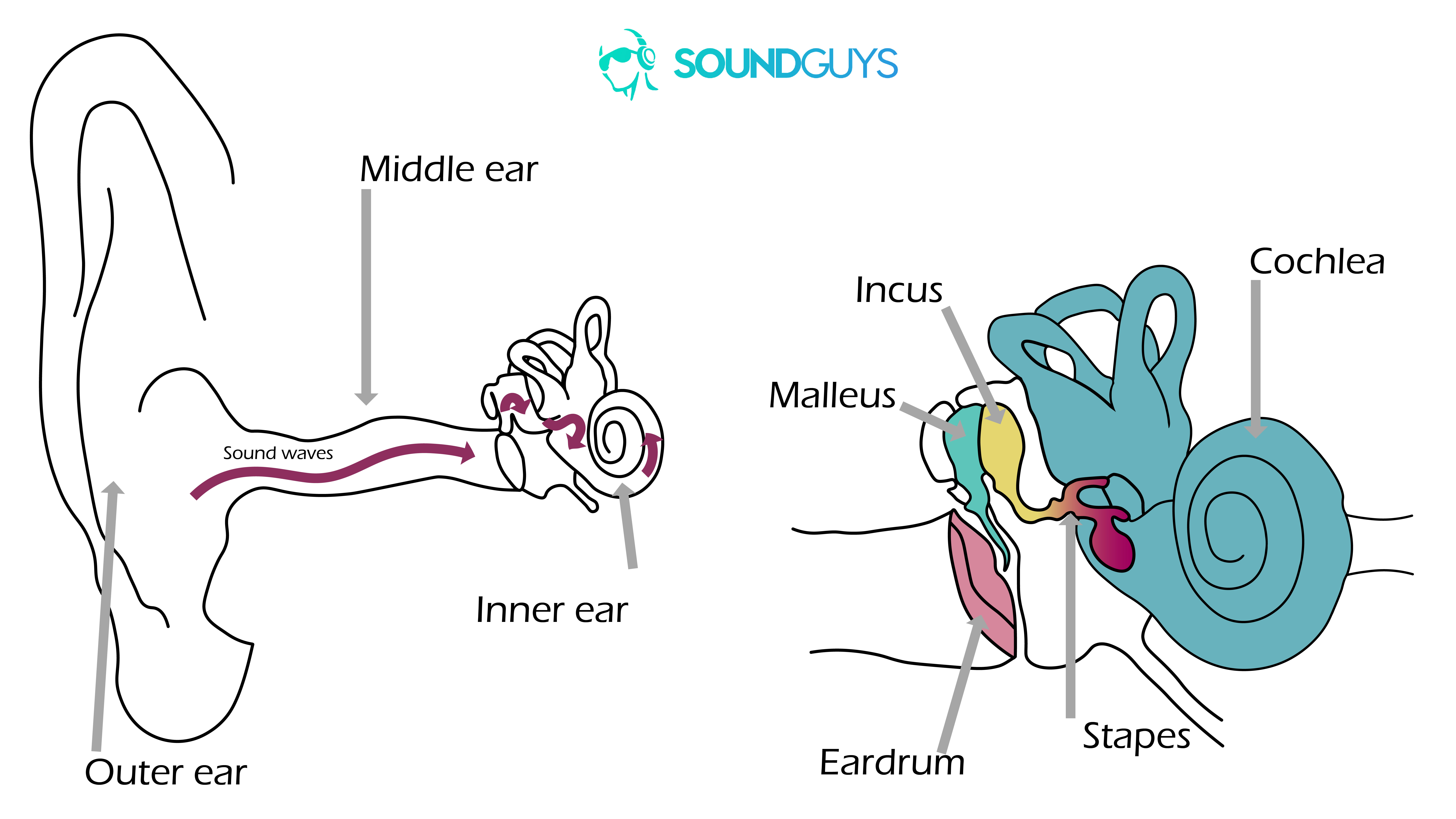
Age-related and noise-induced SNHL, for example from excessive headphone use, result from damage to stereocilia in the inner ear. The destruction of these hair cells leads to reduced sensitivity to certain sound frequencies. The associated neurons, however, can still send signals to the brain. Consequently, tinnitus correlates with abnormal neural activity along the auditory pathway, which reaches from the inner ear into the brain. Current research proposes that tinnitus originates in the central auditory system. In other words, the phantom noise we perceive as tinnitus is likely a product of our brain.
How can hearing aids help with tinnitus?
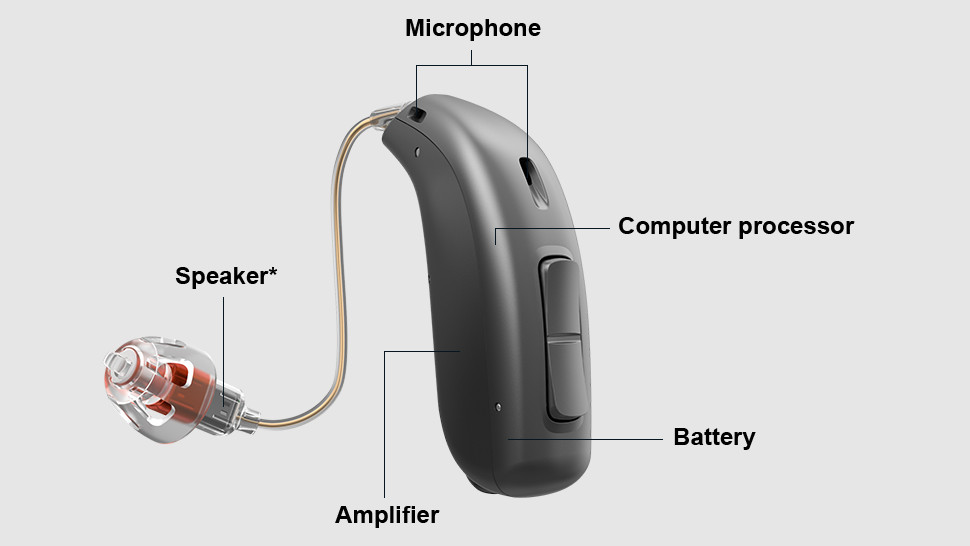
Tinnitus is frequently correlated with hearing loss. When the two conditions are linked, a hearing aid alone can ease the ringing in the ears. Here’s how:
- By amplifying external sounds, particularly speech, the hearing aid offers the brain real sounds to focus on, which can shift attention away from the tinnitus.
- While hearing aids should specifically amplify speech, they also amplify background noise, which can drown out or mask the tinnitus.
- With a properly fit hearing aid, listening also becomes much easier, which can significantly reduce stress and calm the tinnitus.
Severe cases of tinnitus can involve insomnia, anxiety, and depression. Since those cases require more comprehensive interventions, many hearing aids include custom tinnitus programs that can make the constant noise more bearable. When you’re in the market for a hearing aid that can also treat your tinnitus, look for one of the features listed below.
If you don’t have hearing aids, you can try the ReSound Tinnitus Relief app. You can combine up to five sounds from a library of environmental and therapeutic sounds, as well as music, to create a soundscape that’s calming your tinnitus. Likewise, the Widex Zen Tinnitus Management app offers a selection of preset soundscapes, as well as relaxation and sleep exercises. Both apps are available for Android and iOS.
If you have hearing aids, check the respective companion app and, if you don’t see a tinnitus treatment program, speak with your care provider, as they might have to unlock the program for you. For example, users of Widex Moment or Widex Moment Sheer hearing aids should inquire about the new Widex SoundRelax program.
While hearing aids can produce frequencies that extend beyond 8kHz, audiologists rarely test or correct for hearing above 8kHz as it’s not required for communication. If your tinnitus fires at a higher frequency, you might benefit from dedicated masking devices.
Your tinnitus most likely won’t disappear. In that sense, it won’t improve. However, by managing your tinnitus, you will feel less bothered or you may not notice it anymore.
Not all hearing care professionals specialize in tinnitus treatment, but those who do can develop an individualized treatment plan for each particular case (often, one person’s tinnitus manifests differently from another’s) and program hearing aids with particular fractal tones and modulating sound waves. (…) People with hearing loss and tinnitus see the most benefit from hearing aids when they’re worn regularly, and tinnitus sound therapy is active. Tinnitus never goes away completely. But for many sufferers, fractal tones and modulating sound wave therapy effectively condition the brain so it doesn’t notice the tinnitus. For some, the effect is immediate. Others require a couple months before they become habituated. —Dana Helmink, AuD, Senior Director of Audiology and Clinical Education at Widex
Sound therapy
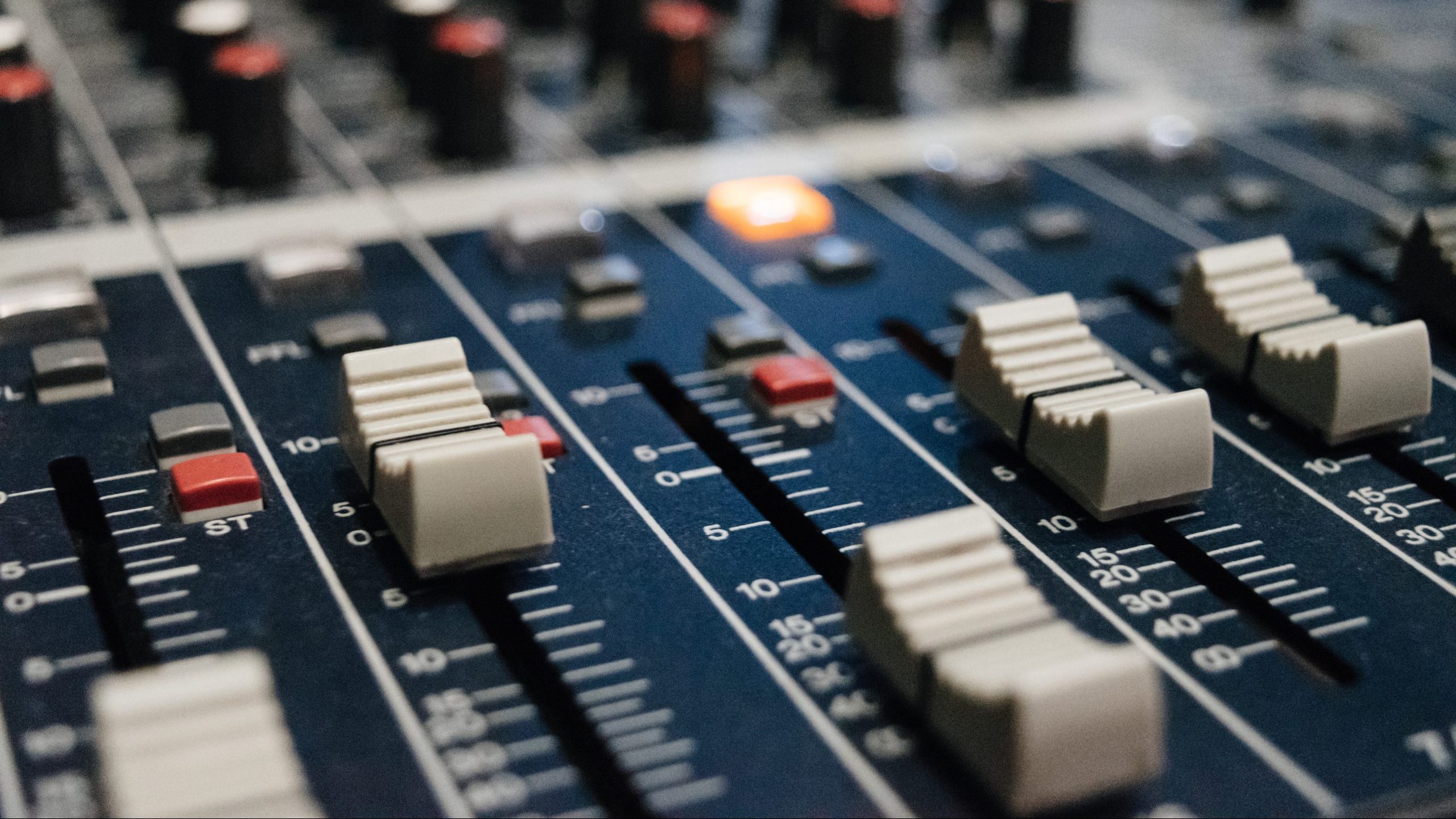
Most types of sound therapy block out the tinnitus with low-level white noise. In an auditory context, white noise is a random collection of equally intense sounds that cover the audible frequency range (20 to 20,000Hz). Exposure to static white noise is a form of masking that distracts your brain from the tinnitus. Your audiologist can customize the sound spectrum to your tinnitus.
Tinnitus Notch therapy
Tinnitus Notch therapy is a feature found in Signia hearing aids. It treats tonal tinnitus, which manifests as a mostly continuous and stable frequency. This therapy eliminates the tinnitus frequency from amplified sound and can quiet the tinnitus. In rare cases, this therapy can even make the hum, ring, or buzz disappear. The method is based on so-called windowed sound therapy, which has shown long-term effects after four to five months of treatment.
Tinnitus retraining therapy

Tinnitus retraining therapy (TRT) combines counseling with sound therapy. According to TRT, when people suffering from tinnitus accept it as harmless stimuli, the noise becomes less irritating, and negative reactions like insomnia or anxiety disappear. This process is known as habituation. While sound therapy can mask the irritating noise to some degree, TRT counseling can interrupt the brain’s damaging feedback loop. The process can take up to two years.
Since audiologists typically administer TRT, you’re bound to come across it when you shop for hearing aids.
Tinnitus masking therapy
Similar in theory to TRT, tinnitus masking therapy focuses on the acoustic stimulation with counseling being mainly educational, rather than therapeutic. The goal is to mask the tinnitus completely. This therapy has been used for many years and appears to be more effective than TRT in the short term.
What other tinnitus treatments can help?
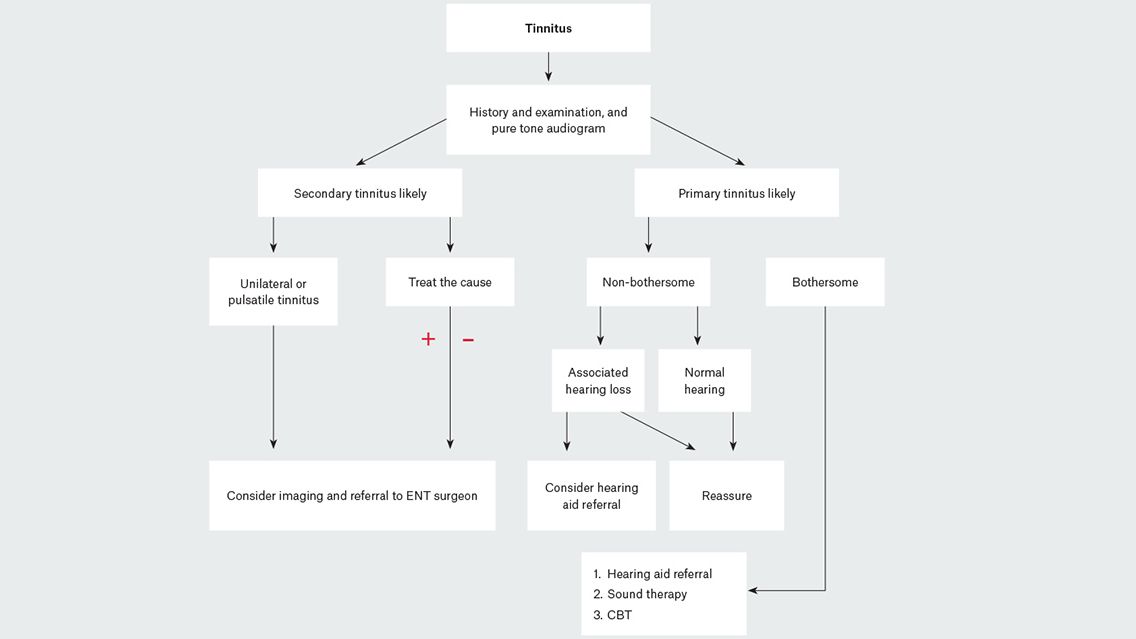
Tinnitus isn’t always associated with hearing loss. Below are tinnitus treatment options in case you don’t require a hearing aid, but find your symptoms bothersome.
Cognitive behavioral therapy or counseling
Cognitive behavioral therapy (CBT) is used for a range of conditions, including depression, anxiety, panic attacks, and tinnitus. CBT targets the patient’s thoughts and behaviors. Ideally, CBT results in a change in thought patterns and subsequent attenuation of the symptoms. In the case of tinnitus, relaxation techniques can divert the attention from the noise to other stimuli. It’s similar to the counseling part of TRT.
While counseling can improve the negative perception of tinnitus, the effect appears to be more significant when patients also use a hearing aid. A small 2022 study showed that tinnitus patients who were fitted with hearing aids and received TRT counseling (developed by Dr. Jastreboff), experienced more tinnitus relief than people who received counseling only.
White noise machines and masking devices
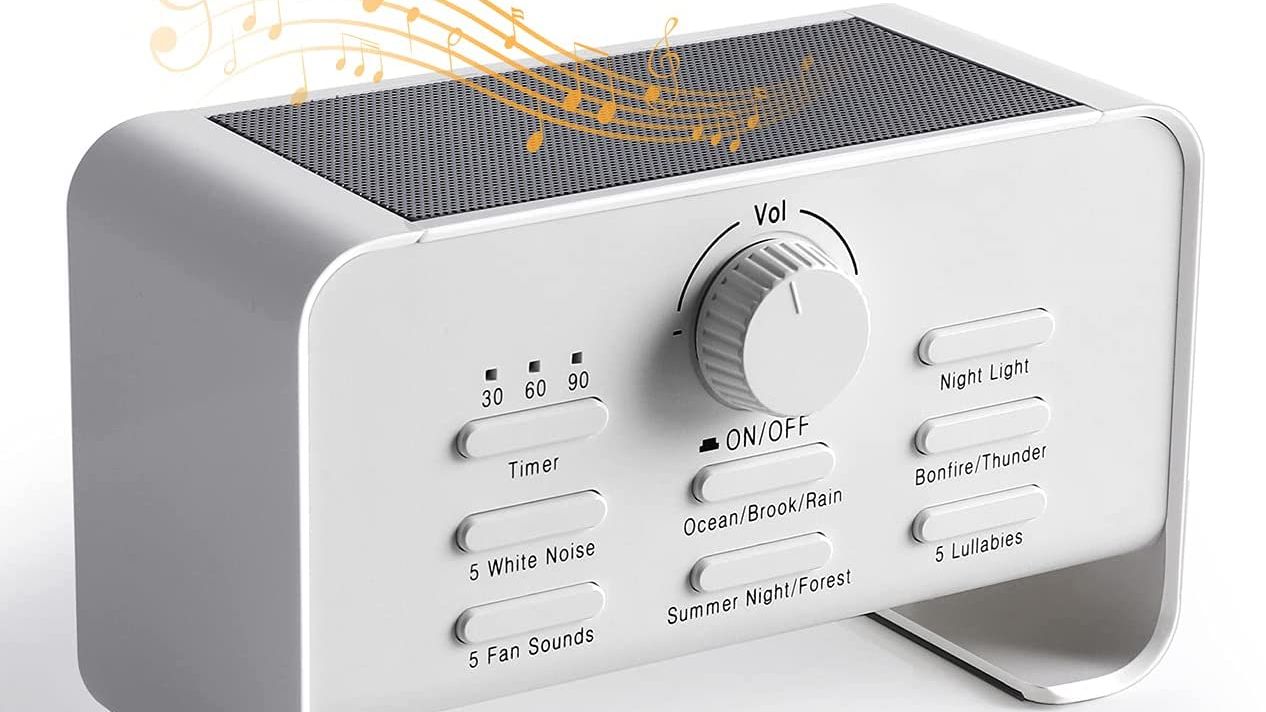
White noise is commonly used to drown out or mask tinnitus. Depending on your tinnitus frequency, similar noises, such as nature or ambient sounds, can also be effective. With the right app, such as ReSound Relief, your phone can be a white or ambient noise machine. You can also find earbud-style tinnitus maskers or radio-like white noise machines, such as the one shown above. These masking devices can cover the full sound spectrum.
Meditation
Like TRT and CBT, you can train your mind to focus on something other than the tinnitus through meditation to bring relief. As your attention shifts away from the tinnitus, the noise becomes less of a distraction, and it might even quiet down over time.
The best thing you can do to prevent tinnitus or its progression is to prevent (further) hearing loss. Buying a pair of noise canceling headphones might be a first step.
Frequently Asked Questions
If you’re wondering whether you have hearing loss, you should take a hearing test. You can start with an online hearing screener. Stat with this tone-based hearing screener, developed by a sound engineer, then follow-up with these speech-based tests, developed by an audiologist. If the results indicate that you have hearing loss or issues with speech comprehension when noise is present, follow up with a thorough in-person hearing test and examination by an audiologist. Your health insurance may cover this expense. You can also get a free professional hearing test at a Costco Hearing Aid Center.